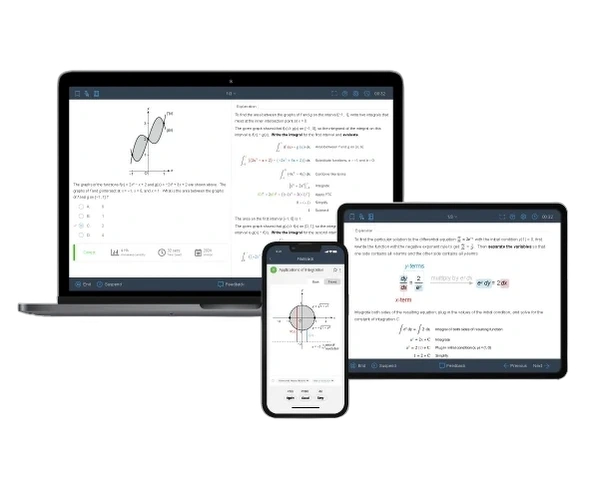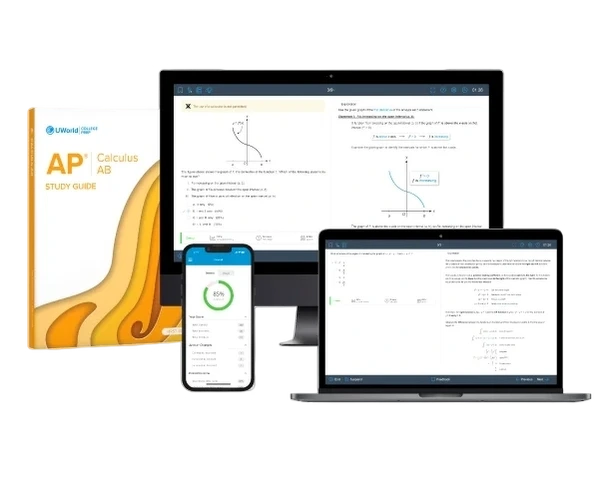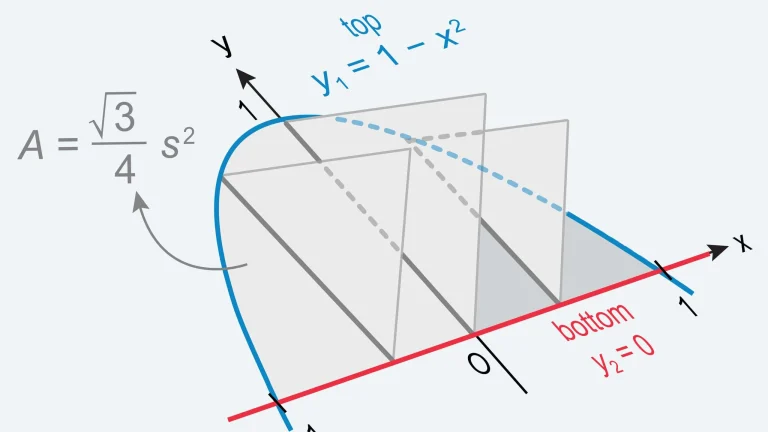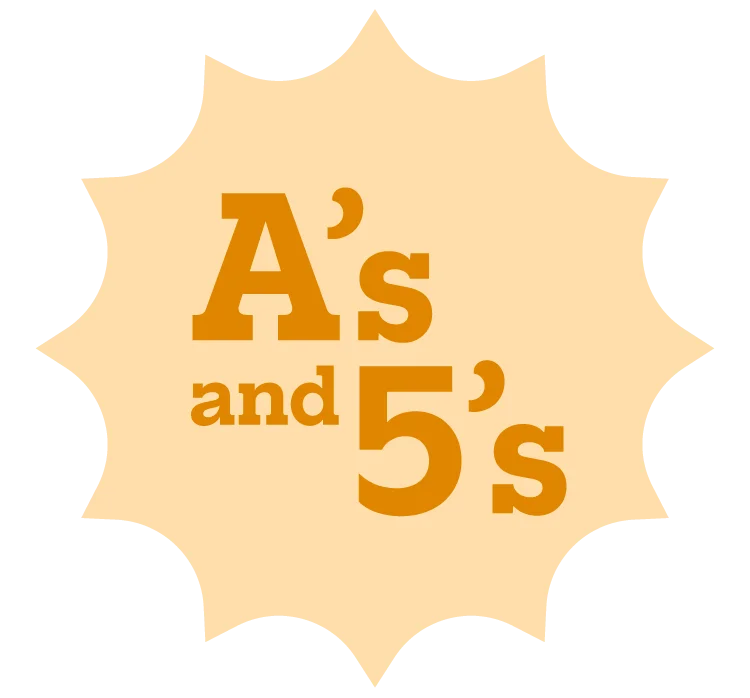The AP® Calculus AB exam rewards strong problem-solving skills and a solid grasp of key concepts. With the right study plan and practice, you can tackle both multiple-choice and free-response questions confidently. Whether you're aiming for college credit or a top score, this guide will help you prepare effectively.
How To Prepare for AP Calc AB
To excel in the AP Calculus AB exam, it's essential to understand the exam format and use effective study resources. Focusing on key concepts, problem-solving practice, and time management will help you maximize your score.
What Does the AP Calculus AB Exam Cover
The AP Calculus AB exam has 2 main sections: multiple-choice questions (MCQ) and free-response questions (FRQ). MCQ section includes 45 questions, and FRQ has 6 questions. Each section contributes 50% of the total score.
- Unit 1: Limits and Continuity
- Unit 2: Differentiation: Definition and Fundamental Properties
- Unit 3: Differentiation: Composite, Implicit, and Inverse Functions
- Unit 4: Contextual Application of Differentiation
- Unit 5: Analytical Applications of Differentiation
- Unit 6: Integration and Accumulation of Change
- Unit 7: Differential Equations
- Unit 8: Applications of Integration
How To Get a Good Score (3, 4, Or 5) On The AP Calculus AB Exam
Aiming for a high score? Here's how to boost your performance: You don't need to ace the AP Calculus AB exam to score a 5 — just under two-thirds of the total points is enough. Mistakes are normal, especially on a tough exam like this. Simply keep these important factors in mind:
- Scoring a 5 doesn't require perfection. Having a deep understanding of key topics, such as derivatives, integrals, and related rates, can put you in a good position.
- Start at least 3-6 months in advance, practicing with MCQs and FRQs while tracking your progress.
- Practice under timed conditions to improve pacing, accuracy, and problem-solving speed.
- Use the summer before school starts to review algebra, pre-calculus, functions, limits, and trigonometry.
- Familiarize yourself with the AP Calculus AB Course and Exam Description to understand key topics.
- Talk to your AP teacher about expectations and areas that may need extra attention.
According to the College Board®, 21.4% of 278,657 test-takers scored a 5 on the 2024 AP Calculus AB exam.
AP Calculus AB Exam Review/Study Materials
Here's a curated collection of study materials to streamline your AP Calculus AB exam prep. While many of these resources are mentioned throughout this guide, we've compiled them here for easy access.
- Practice with UWorld AP Calculus AB Online Course for advanced AP-level MCQs with in-depth explanations to help you learn from mistakes.
- Review College Board FRQs from past exams that provide excellent practice for those sections.
- Watch UWorld course videos for concise and engaging lessons that simplify complex topics.
- Use Khan Academy for introductory-level videos with basic skill-building questions.
- Check out Professor Leonard for in-depth college lecture videos, though they may be lengthy.
- Experiment with resources like Paul's Online Math Notes, or UWorld's AP Calc AB study guide (print and e-book) to find what works best.
AP Calculus AB Study Plan & Exam Tips
It's the spring semester, and it's crunch time! No matter how much time you have left, we've got some handy tips to help you get ready for the exam. Here's a straightforward AP Calculus AB study plan you can follow:
- Begin in February to ensure ample time to cover all units.
- Unit 1 - Limits: Spend 1 week.
- Units 2-5 - Derivatives: Allocate 2 weeks.
- Units 6-8 - Integrals: Dedicate 2 weeks.
- Refresh your understanding using your textbook or UWorld's prep book.
- Set aside 2 to 3 short sessions each week to review exam-style AP Calculus AB practice questions.
- Consistently revisit challenging concepts.
- Start timing your MCQs to match exam conditions: Aim for 2 minutes per non-calculator question and 3 minutes per calculator question.
- Review past FRQs from the College Board to familiarize yourself with potential essay questions.
- Outline and practice writing responses at least twice a month.
- Time yourself to adapt to the exam pace.
- Create and review flashcards daily for key formulas and rules.
- Regularly schedule breaks to stay refreshed — plan a day off each week or take an afternoon off when necessary.
- Start with a general review of course topics, unit by unit at a quicker pace.
- Utilize resources such as textbooks, class notes, and course materials for concept refreshers.
- Prioritize completing textbook practice problems and using the UWorld QBank 2 to 3 times per week for 20-30 minutes per study session.
- With UWorld: To save time, focus on explanations for missed questions and reviewing the concepts that need the most improvement.
- Limits and Derivatives (Units 1-5): Allocate 2 weeks, approximately 1 unit every 2 days.
- Integrals (Units 6-8): Allocate 1 week, approximately 1 unit every 2 days.
- Use any remaining time to review concepts from each unit which you missed previously to reinforce learning.
Kick off your study by tackling a few UWorld AP Calculus AB MCQs in each topic to spot the ones that are harder for you. Dive into the explanations for any questions you miss. If you're still feeling shaky, throw in a video or review your notes on those tough topics. Then, circle back with more UWorld questions to see how much you've improved!
Spend most of your week diving into FRQs — they're a great way to cover lots of topics at once and are efficient for review. Plus, they make you show your work, which helps you get a solid handle on the whole problem-solving process.

When to Start Preparing For AP Calculus AB Exam
| Student Profile-Based Recommendations | ||
|---|---|---|
| Type of Test Takers | Description | Recommended Timeline |
| Busy | Students with busy schedules need a longer prep period but shorter study sessions that fit easily into their routine. | 180 or 360 days |
| Not a Good Test Taker | Students who need to build confidence and familiarity with the exam content | |
| At a Plateau | Students who have difficulty progressing can benefit from practicing challenging questions and improving their approach. | 30 to 90 days |
| Just Getting Started | Students who want to get familiar with the exam format benefit from practicing with real questions and exam-like conditions. | |
| Retaking the Exam | Students who have already pinpointed problem areas and need to improve strategically | |
| Stressed by the Clock | Students who want to get comfortable with time pressure and learn to avoid common trick answers. | 90 to 180 days |
Take the AP Calc AB Exam with Confidence
Preparing for the AP Calculus AB exam isn't just about studying — staying calm and well-rested is just as important. Managing stress, taking breaks, and getting enough sleep can help you stay focused and perform at your best on test day.
- Take breaks between study sessions to give your brain time to absorb and retain information.
- Get a full night's sleep to sharpen your memory and improve problem-solving skills.
- Incorporate humor into your routine — watching or reading something funny can help reduce stress and boost focus.
- Practice deep breathing and mindfulness techniques to stay calm and manage test anxiety.
- Maintain a positive mindset and trust your preparation to boost confidence and reduce stress.
- A well-rested and relaxed mind will help you tackle even the toughest calculus problems with clarity and confidence!
Frequently Asked Questions (FAQs)
Which AP Calculus AB units are the most difficult to learn?
On AP Calculus AB, certain units — such as Units 4, 5, and 8 — are particularly challenging. Mastering the separation of variables, understanding volume formulas, and avoiding common errors, especially in u-substitution, will significantly improve your performance. To succeed, practice consistently, review your mistakes, and cross-check your work by differentiating your results.
Which sections can you use calculators in the AP Calc AB exam?
On the AP Calculus AB exam, only graphing calculators and built-in Desmos graphing calculators through BluebookTM are allowed. You can use a calculator in Part B of the multiple-choice section and Part A of the free-response section.
Is it possible to study for the AP Calc AB exam on my own and still get a 5?
Yes. It is possible to achieve a high score, even if you self-study. The key to mastering AP Calculus AB is using a variety of learning strategies. By incorporating videos, reading materials, and practice problems into your routine, you can develop a well-rounded understanding of the material. Read our article about how to self-study for AP Calc AB for more information.

References
- Past AP Calculus AB Score Distributions. (2024). apcentral.collegeboard.org. Retrieved December 11, 2024, from https://apstudents.collegeboard.org/about-ap-scores/score-distributions/ap-calculus-ab
- 2024 AP® Calculus AB Scoring Guidelines. (2024). apcentral.collegeboard.org. Retrieved December 11, 2024, from https://apcentral.collegeboard.org/media/pdf/ap24-sg-calculus-ab.pdf
AP Calculus AB Related Topics
Master AP Calculus AB FRQs with our step-by-step guide. Learn tips and strategies to tackle free-response questions and maximize your score on the exam.
How to Approach AP Calculus AB MCQsMaster the best tactics for AP Calculus AB MCQs. Our tips help you understand question types and solve multiple-choice questions quickly and efficiently.
AP Calculus AB Formula SheetAccess the essential AP Calculus AB Formula Sheet — easily find all the critical formulas you need in one convenient place to enhance your preparation.
How to Self-Study for AP Calculus ABWant to ace AP Calculus AB on your own? Follow this expert self-study guide with tips, tricks, and tools to prepare effectively for the exam.
Best AP Calculus AB Study Guide ComparisonCompare the best AP Calculus AB study guides! See how Kaplan, Barron's, and Princeton Review stack up against UWorld for comprehensive exam prep.
Best AP Calculus AB Prep Course ComparisonSearching for top AP Calculus AB prep courses? Read this review to compare the best courses and choose the perfect one for your success.




